Africa has produced a number of female authors who were, and still are, able to assert themselves as writers, both on a national and international scale. However, information on the lives and works of these authors are scant. Having said that, the aim of this article is to provide the reader with a brief biographical outline of each author; expand on some of their influences and themes in their work as well as highlighting some of their most notable publications.
Zukiswa Wanner (1976-)
Writer. Feminist. African. Mother. Lover (Wanner, 2015). This is how Zukiswa Wanner describes herself on her blog and websites where she shares her thoughts and writings. Zukiswa Wanner, or Zuki as she is referred to by those closest to her, was born in Lusaka, Zambia to a South African father and a Zimbabwean mother. She received her primary and secondary education in Zimbabwe after which she pursued a degree in Journalism at the Hawaii Pacific University in Honolulu.
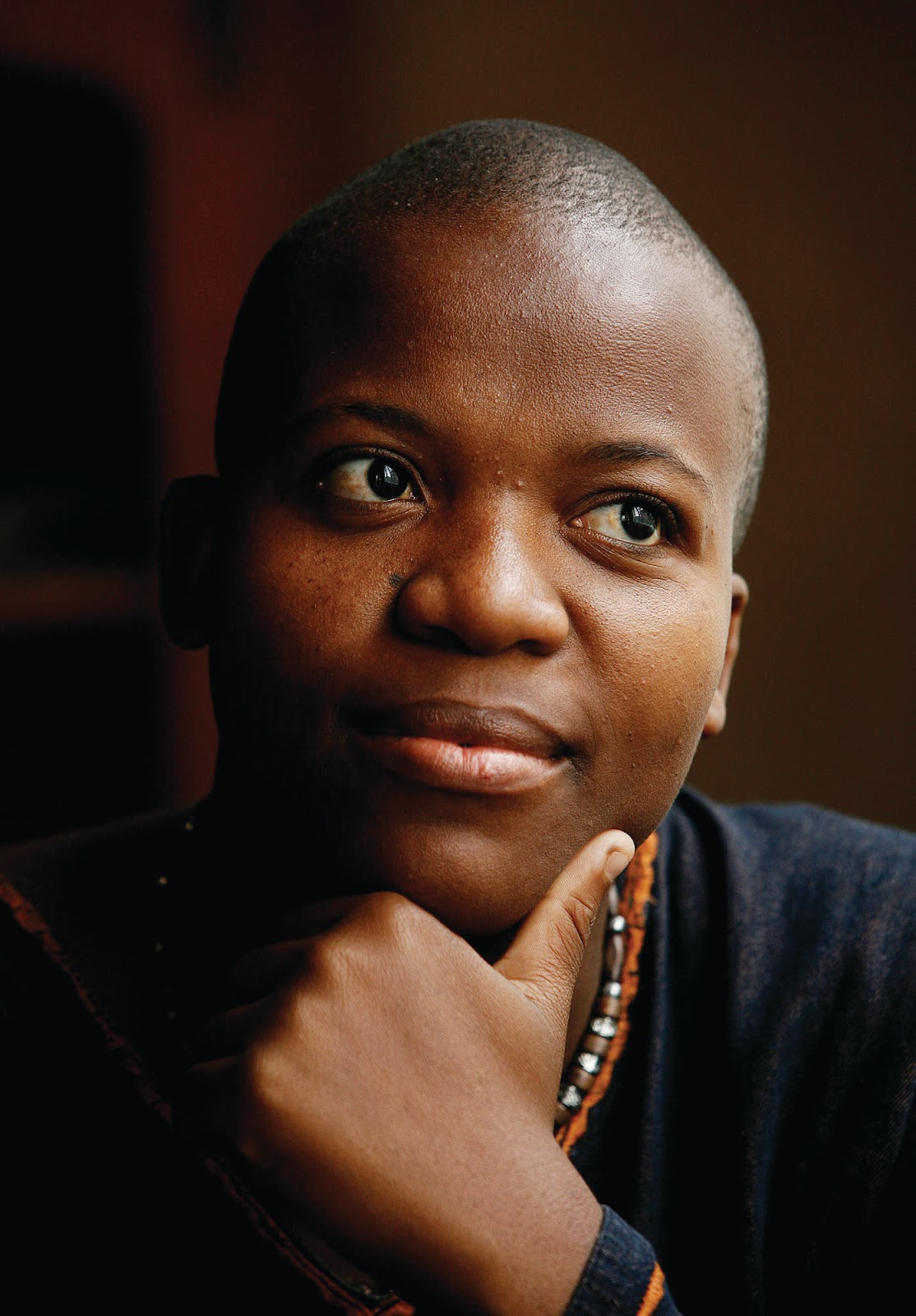 Zukiswa Wanner (The 2014 Writivism Short Story Prize Judges, 2014) Image source
Zukiswa Wanner (The 2014 Writivism Short Story Prize Judges, 2014) Image source
In a recent interview, Zukiswa cites contemporary South Africa and its underlying narratives as her main influence. She can be described as being a product of her time, allowing the political and social contexts in which she abides to guide her writing. Her novel, Maid in SA (2013), bears testimony to this. Here she writes about the relationship between the ‘madams’ and their ‘maids’ in post-1994 South Africa and the various scenarios both parties face in their different roles. Although it is riddled with humourous scenarios one is nevertheless confronted with the reality of the masked power dynamics which reflect pre-1994 sentiments and dispositions.
As an African journalist and novelist, Zukiswa Wanner has produced work that has been lauded by many in the literary world. Her debut novel for Oshun, The Madams (2006), was shortlisted for the K. Sello Duiker Award in 2007 and her subsequent work was met with similar praise. Two of her most recent puclications includes Men of the South (2010) and London Cape Town Joburg (2014), were also successful with Men of the South (2010) being shortlisted for the Commonwealth Writers Prize in 2011. Following this success Zukiswa in April 2014 was named one of the 39 of Sub-Saharan African writers under the age of 40 by Hay Festival Africa.
As a journalist she has also contributed to a range of South African newspapers and magazines such as The Observer/Guardian, Sunday Independent, City Press, Mail & Guardian, La Republica, Open Society, Sunday Times, African Review, The New Statesman, True Love, Shape, Oprah, Elle, Juice, Afropolitan and Forbes Africa. (Zukiswa Wanner, 2015). Furthermore she has also expanded her literary interests to the benefit of communities in South Africa and the continent with ReadSA being one of the initiatives that she has helped to establish. This initiative works to help encourage South Africans to purchase and read original South African work (Zukiswa Wanner, 2012). She currently resides in Nairobi, Kenya where she continues to write.
Olive Schreiner (1855-1920)
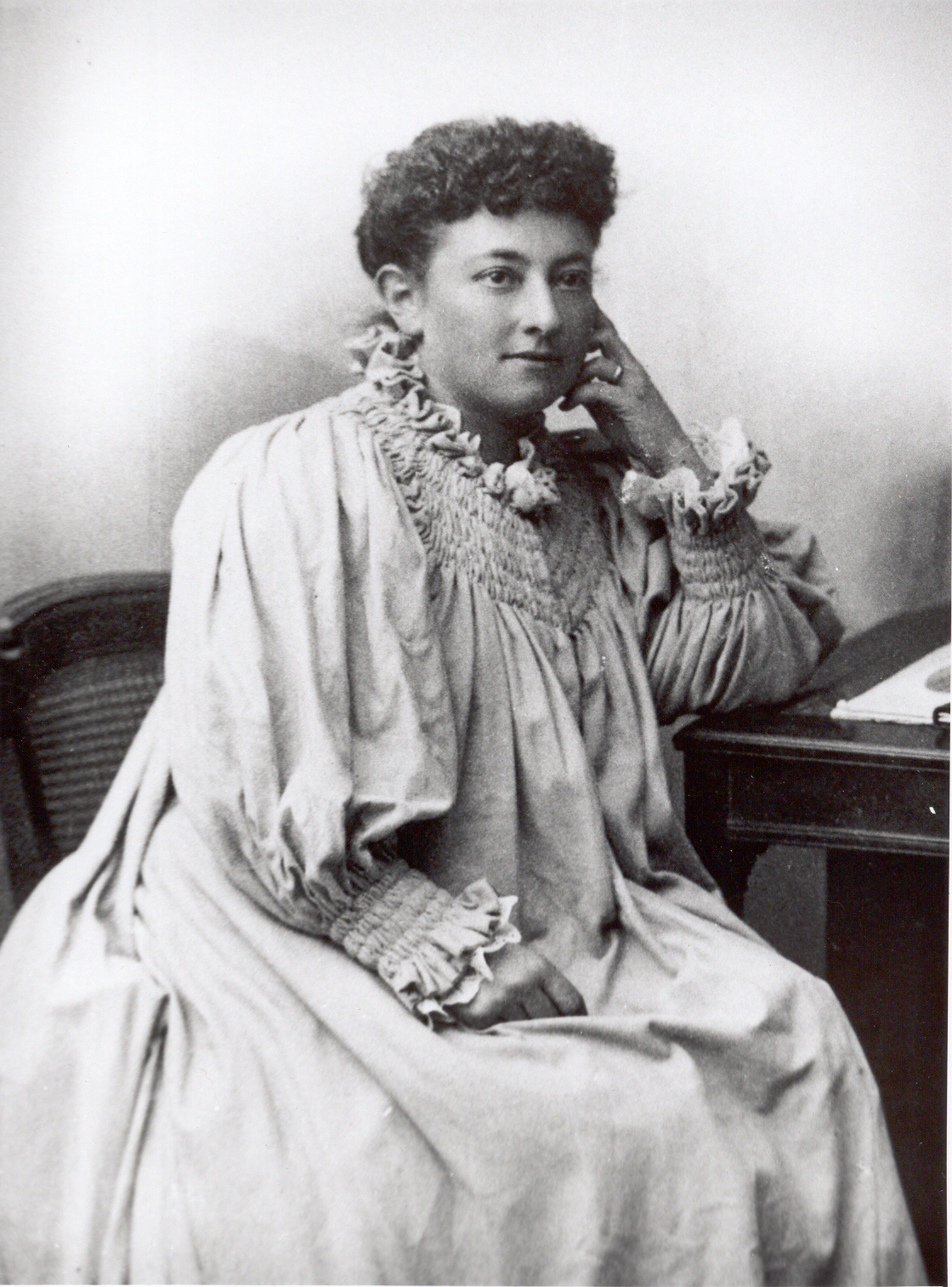 Olive Schreiner Image source: (Cronwright-Schreiner, S.C. 1924. The Life of Olive Schreiner. London: Fisher Unwin) (Book)
Olive Schreiner Image source: (Cronwright-Schreiner, S.C. 1924. The Life of Olive Schreiner. London: Fisher Unwin) (Book)
In the late 19th and early 20th century, Olive Schreiner was already making a name for herself as a writer, feminist, and political and social critic of the day. Regarded as one of the leading Southern African female writers of the 20th century, Schreiner was born on the 24th of March, 1855, in Wittenbergen, Basutoland, now Lesotho. Schreiner achieved international acclaim after the publishing of her novel, The Story of An African Farm (1883). Born into a poor missionary family with eleven other siblings, her father and mother were of German and English decent respectively, and both had a strong influence on their daughter’s early independence. Schreiner, through her writing, became infamous as an outspoken spokesperson for feminist, socialist and anti-imperialist ideals of the day. Self-educated like many of the women of the era who occupied similar positions as she, Schreiner’s influences included John Stuart Mill and Charles Darwin. It was through these authors and their readings that she consolidated her own progressive agenda.
She rejected gender roles that she believed placed limitations on women’s independence, and by the time she had reached 15 years of age she had begun to share sentiments of disapproval with the religion in which her family had raised her. This conflict between her family’s beliefs and her own convictions would be the beginning of the onset of the depression that would plague her for the rest of her adult life.
At age 19 she began her work as a governess while beginning to put her thoughts on paper in her spare time. During the next five years she would work for different wealthy families in the Cape and would, with the help of a friend, eventually travel to England to train as a nurse and attempt to have her work published. Upon her arrival in England, her asthma became a chronic illness which then deemed her unfit to train and serve as a nurse. The manuscript for The Story of An African Farm was accepted by the English publishers, Chapman and Hall, in 1882 and was published under a pseudonym the following year. The chosen pseudonym, ‘Ralph Irons,’ was a deliberate move because of the prejudice that women writers faced at the time. The book’s depiction of life in South Africa won it international acclaim as there had been no works like it previously. The book also generated its fair share of controversy as it showcased Schreiner’s progressive views on marriage and religion. The success of her novel allowed her to reveal her true identity in 1891 and with this success came a new standing with leading feminist socialists of the day. Her asthma required her to return home to South Africa in 1889 and she settled in the Karoo. In 1894 she married Samuel Cronwright, a man who encouraged her to continue with her writing and appeared to share the same convictions and beliefs as her. Olive retained her maiden name and in a controversial and progressive move for the time, her husband took on the joint last name, Cronwright-Schreiner.
Olive Schreiner suffered from another period of depression following the death of her baby girl who died a few hours after birth, followed by the deterioration of her marriage. Olive Schreiner and her husband thereafter moved to Johannesburg due to Olive’s health concerns as her asthma had resulted in her developing a heart condition.
In 1911 she published another book, one which would become one the leading feminist texts of the early 20th century. Women and Labor (1911) was lauded by feminists as yet another work by Schreiner demonstrating her commitment to the cause. She began travelling to Europe to tend to her health concerns but soon after the end of the First World War she returned home to South Africa in 1920 as her health had deteriorated considerably. She died within months and was buried alongside her daughter in the Karoo.
Mariama Bâ (1929-1981)
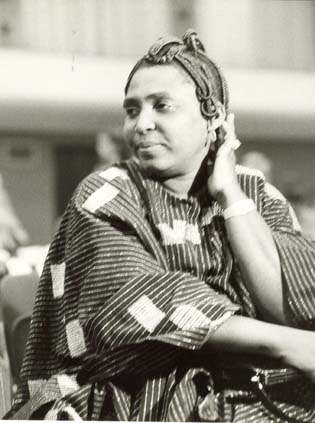 Mariama Ba (Mariama Bâ – the first African Feminist Writer ) Image source
Mariama Ba (Mariama Bâ – the first African Feminist Writer ) Image source
Few West African feminist texts have been studied so widely as Mariama Bâ’s So Long a Letter. Born in Senegal in 1929, Mariama Bâ was an icon of African Literature as a writer who promoted her work and herself as a “Modern Muslim Woman”. Her novels achieved almost instant recognition and So Long a Letter, published in 1981, was awarded the prestigious Noma prize for writing. The text was first written in French and only later translated into English. It has since been translated into over a dozen languages and remains one of the worlds most studied feminist literary texts for its critique of the role played by marital institutions and religion in the oppression of women. Much like Olive Schreiner, who wrote nearly 80 years before her, Bâ concerned herself with giving a voice to the experiences of women.
She was born in Dakar into a relatively affluent and educated family. She was raised into the religion of Islam but came to criticize the treatment of women by religion. Following the death of her mother, Bâ was raised by her maternal grandparents who did not believe that girls should receive an education. However, on her father’s insistence, they allowed her to continue with her education. She married a Member of Parliament, Obeye Diop, with whom she had 9 children. However, their marriage was short-lived and she was left to care for the children on her own.
It was this experience that she channeled into the writing of her first novel. So Long a Letter (1981), written in the form of a long letter addressed by the protagonist to a childhood friend, details the struggles of being a woman in a religious society and details the sorrow and hardships women face. Mariama Bâ died a year after the release of her debut novel, prior to the publication of her second novel, Scarlett Songs (1986).
Bâ, was a prominent law student during a time when women faced numerous obstacles in the pursuit of higher education. She often won prizes for her academic work while in school, such as the First Place Prize for her entrance exams to a Teacher training college. It was at the college that she was noticed by the head of the school, who further encouraged Bâ to enrich herself intellectually. Her students around the world contend that her life was one that was much too short, but lived to the fullest and filled with many rich events that influenced her work as an advocate for African women.
Buchi Emecheta (1944-)
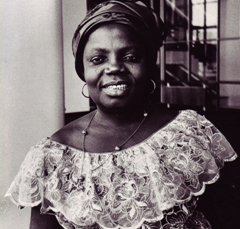 Buchi Emecheta (Black British Woman Writers, 2015) Image source
Buchi Emecheta (Black British Woman Writers, 2015) Image source
Buchi Emecheta was born in the Nigerian city of Lagos on 21 July in 1944. She began to work as a Librarian following her move to Britain in 1960. It was there that she enrolled at the University of London in 1970, studying towards a degree in Sociology. During this period beginning in 1970, Emecheta worked as a community worker in North London. Much like the feminist writers who preceded her, her work focused on the politics of race, gender and sex based largely on her personal experiences. Her debut novel, In the Ditch, was published in 1972 as a series of articles in the magazine The New Statesman. This novel, alongside her second novel, Second Class Citizen, offers a view into the life of a poor Nigerian woman struggling to fit into the community in one of Europe’s biggest cities (Biography: Buchi Emecheta, 2015).
Her subsequent works depicted accounts of women’s experiences in female child-rearing, while facing numerous obstacles which included the changing values of traditional societies. Buchi Emecheta is also the author of several novels for children, including Nowhere to Play (1980) and The Moonlight Bride (1980). She published a volume of autobiographical tales, Head Above Water, in 1986. Her television play, A Kind of Marriage, was first screened by the BBC in 1976.
In the late 1970’s she was a visiting professor at several universities in the United States. It was also during this time in 1979 when she received the prestigious New Statesman Jock Campbell Award for Commonwealth Writers. She retuned to Nigeria in 1980 to work as a visiting Professor of English at the University of Calabar. Following this she ran a publishing house alongside her son that had branches in London and Ibuza. She remains a literary contributor to many leading magazines which include the literary segment of The Times.
Chimamanda Ngozi Adichie (1977-)
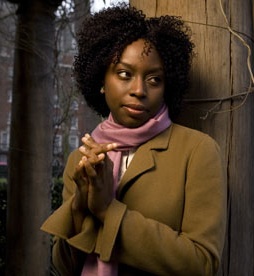 Chimamanda Ngozi Adichie Image source
Chimamanda Ngozi Adichie Image source
Fast becoming Africa’s best known young author and receiving much international acclaim, Chimamanda is yet another successful female author hailing from the African continent. Born in Nigeria in 1977, her father was a professor at the University of Nigeria and her mother was the first female registrar of the institution (Feminism Is Fashionable For Nigerian Writer Chimamanda Ngozi Adichie, 2014). A straight A student at school, she became infamous for disagreeing with her teachers on certain issues. Receiving a number of academic awards at school, she chose to study medicine at the University of Nigeria. However, she soon dropped out of university to pursue a career in writing. She obtained a scholarship to Drexel University in America when she was 19 years old, and left Nigeria to fulfill her dream. She studied communication at Drexel and completed a degree in communication and political science at Eastern Connecticut State University, summa cum laude, in 2001. Ngozi cites Chinua Achebe as one of her main influences and maintains that reading his book ,Things Fall Apart, at the tender age of 10, made her realize that people who look like her could exist in books (Hellstern, 2015).
As a feminist, her writings deal with the experiences and representations of women. By the time she was 21 Chimamanda had already published a collection of poems entitled Decisions (1997) and a play, For Love of Biafra (1998) in which she details the brutal experiences of an Igbo woman, her own ethnic group, during the civil war of the 1960’s. She also explores ethnicity in Nigeria and what it means to different people. Her first novel, Purple Hibiscus (2003) was well received; set in Nigeria following the political turmoil during the 1990’s, the story follows the life of a fifteen year old Nigerian girl, Kambili, and her family. The narrative explores the ways in which Kambili and her brother respond to their father’s authoritarian attitude within the face of alternative models provided by her liberal aunt and Igbo traditionalist grandfather. Themes which come across include family, religion, tolerance and politics. Her second novel, Half of a Yellow Sun, was published in 2006, also to critical acclaim. It is set before and during the Biafran war and told from the perspectives of three different characters, raising class-, gender- and race-related issues. It received several prestigious literary awards, including the Orange Broadband Prize for Fiction in 2007 (Tunca, 2014). Other notable publications include her short story book The Thing Around Your Neck (2009); Americanah (2013) which won the National Book Critics Circle Award for Fiction among others; as well as her latest publication We Should All Be Feminists (2014). She now divides her time between Nigeria and the United States (Chimamanda, 2014).
NoViolet Bulawayo (1981-)
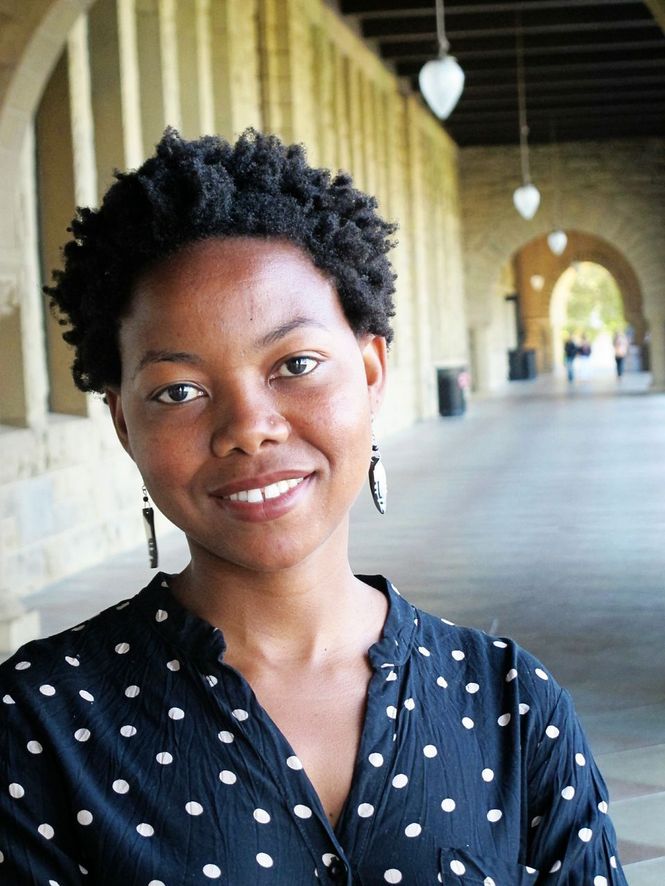 Noviolet Bulawayo Image source
Noviolet Bulawayo Image source
Born and raised in Zimbabwe, Bulawayo is fast becoming one of the most recognizable names in African literature. She moved from Zimbabwe to Kalamazoo in 2000 at the age of 18 where she continued her education in the United States at Kalamazoo Valley Community College. She went on to obtain Master’s Degrees in English from Texas A&M University-Commerce as well as the Southern Methodist University. She also completed a Master of Fine Arts in Creative writing at Cornell University. It was this body of work which earned her the Truman Capote Fellowship in 2010 (Mushakananhu, 2014). She published her debut novel, We Need New Names, in 2013, to critical acclaim. The coming of age bildungsroman details the life and experiences of a Zimbabwean girl named Darling, as a 10 year old girl and later as teenager living in the United States of America. The book has been recognized by the LA Times Book Prize Art Seidenbaum Award for First Fiction, the Pen/Hemingway Award, the Etisalat Prize for Literature, the Barnes and Noble Discover Award (second place), and the National Book Foundation “5 Under 35” Fiction Selection (Bulawayo, 2015).